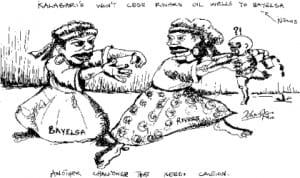Editorial
Floods: Averting Food Shortage
 Following the flood that ravaged parts of Nigeria recently, speculations are now rife over a possible scarcity of food in the country. While this may be blown out of proportion, the truth is that agriculture was disrupted in many places which consequences the government need to watch out for.
Following the flood that ravaged parts of Nigeria recently, speculations are now rife over a possible scarcity of food in the country. While this may be blown out of proportion, the truth is that agriculture was disrupted in many places which consequences the government need to watch out for.
This, perhaps, is why President Goodluck Jonathan assured Nigerians that there would not be food scarcity on account of the floods in parts of Nigeria. He promised to release grains and other food stuffs from the national reserves to supplement any shortfall in case of food crisis.
While The Tide holds Federal Government to this promise, we hope that everything would be done to check hoarding and artificial food scarcity by some unscrupulous Nigerians whose stock in trade is to cash in on any opportunity to exploit the populace.
It is true that the flood ravaged parts of the food belt of Nigeria, but the assurances of the Federal Government to ensure regular food supply has come at the right time to set the facts straight and protect the ordinary people from opportunists.
Instead of taking advantage of the disaster, this is the time Nigerians should be more patriotic by supporting the government to come out of the impact of the flood. Rather than stockpile food items for their selfish interests, Nigerians must answer the national call by being more compassionate than ever before.
Food security which perhaps was treated with kid gloves in the past must be taken more seriously now. Clearly, food supply on the whole must become a major national challenge in the immediate future because of the effect of climate change all over the world.
This is why government at all levels and all well-meaning organisations must work more at achieving food security for Nigeria. Like the effort of the Federal Government in promoting cassava bread and local rice production, Nigerians must begin to look more inward for their food needs.
The Tide acknowledges the efforts of state and federal government in cushioning the effect of the floods through the immediate release of food items, water medications, tents and palliatives; we think that as part of plans to return flood victims to their homes should include helping them to restart their farms.
Government should also take interest in food preservation and storage in the country. It is regrettable that till date a good percentage of farm products end up as waste following poor storage facilities. It is a common sight in our cities and communities to see heaps of grains, fruits, vegetables thrown away because they got rotten owing to lack of market. In other climes these produces are processed and stored for better use.
It is sad that Nigeria imports over two trillion Naira worth of foodstuffs from other countries annually. This cannot stop until our preservation techniques improve. Even more desirous is the re-invention of the marketing boards that would take the burden of marketing farm produce from the ordinary farmer.
A situation where we look beyond our borders for virtually every agricultural product must be discouraged as no country can advance to the next level if she depends on others for her every food need.
As the Federal Government plans to intervene in the area of food supply in the immediate future, two things must be put in mind for the expected benefits to be achieved. The first is the attitude of some officials who would abuse the distribution of releases from the national reserves, as exemplified by the distribution of relief to flood victims in some places.
Secondly, the subject of climate change has become real all over the world. With it is the consequence, even on agriculture and food sufficiency that Nigeria must begin to find workable solutions for.
Editorial
AFCON ’25: Bravo, Super Eagles, But…

Editorial
Fubara: Celebrating A Leader At 51

Editorial
Beyond Accessing Bonny By Road


